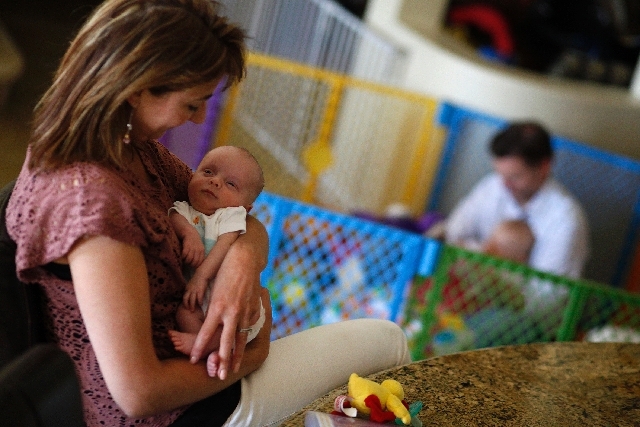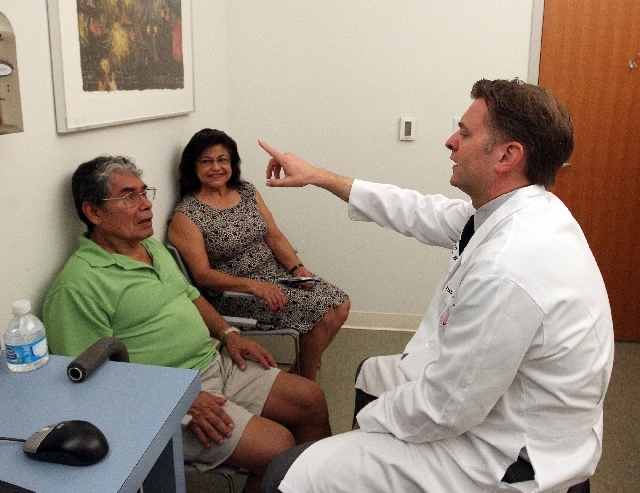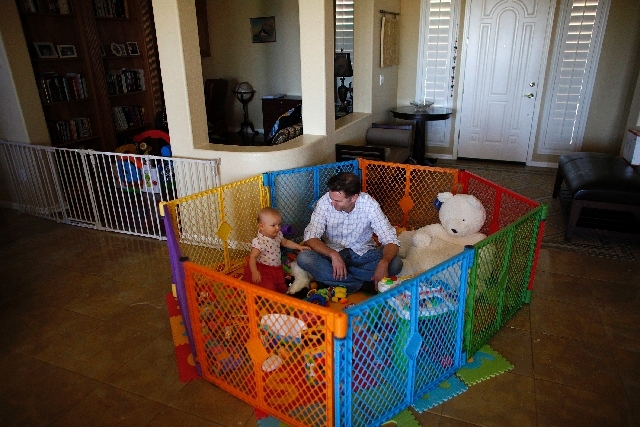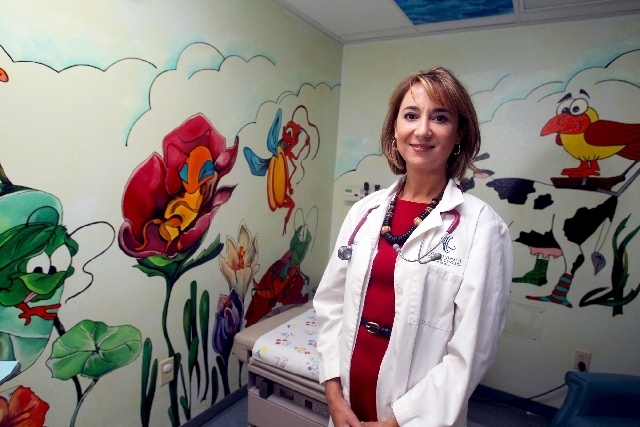Married doctors working to balance personal, professional lives




Standing in the living room as her husband, Ryan, answers the doorbell, Alexandra Walsh cradles their 6-week-old son, Colin Alexander, in her arms, kissing him gently on one cheek and then nuzzling the other.
As her mommy stands above her, 12-month-old Eva Walsh, fresh from her daddy’s arms, giggles as her experiment with walking takes her to a stumbling, arms up, head first, soft landing on love-seat cushions.
Sitting nearby, 6-year-old Liam Walsh puts an iPad through its paces.
“Colin’s doing fine now,” the mother of three coos as she once again kisses the little one she holds.
In May, however, she wasn’t sure how her baby — delivered five weeks early by emergency C-section after she went into preterm labor — would fare.
Nor was she sure it was OK for her to cry when she saw tiny 3 pound, 12 ounce Colin hooked up to the wires and tubes that kept him alive.
“I was embarrassed by my crying. Here I am a doctor and I’m thinking I should know how to handle this. Everyone there, of course, said it was OK for me to cry. It’s one thing to be a doctor and to know what’s likely, and it really is different being a mom. I was so worried about him when he was in the hospital for three weeks.”
Dr. Alexandra Walsh. Dr. Ryan Walsh. Two Las Vegas physicians trying to keep patients from either succumbing to cancer or movement disorders — doctors working hard at trying to find just the right balance between family and the practice of medicine.
In a country where insight into the lives of physicians often comes from TV series such as “General Hospital,” the soap opera celebrating 50 years this year, it’s instructive, but admittedly less racy, to talk with a couple early in their healing-profession careers about the proper balance between personal and professional lives.
She’s a pediatric oncologist with Comprehensive Cancer Centers of Nevada and he deals largely with Parkinson’s disease patients at the Cleveland Clinic Lou Ruvo Center for Brain Health. How good they are at striking a balance can affect their families, but also patient care.
Studies show that one in 10 physicians, often describing themselves as stressed out, develop problems with alcohol or drugs during their careers, about the same rate as other white-collar professionals.
But what makes physicians unusual, addiction experts say, is their knowledge of what heavy drug use can do, their easy access to medication and the risk to patients. Some patients’ rights safety groups are so concerned that they have called for mandatory drug testing of medical professionals, an action many in the medical community argue would infringe on personal privacy.
Dr. Ryan Walsh, at 39 a year older than his wife, says he and the woman he calls “Lexa” are well aware that some physicians have problems with drugs or alcohol.
“If you’re in medicine long enough, you see that some doctors don’t have a good way to cope with stress,” he says.
That inability, he adds, can also mean broken families. Among the top seven professions with high divorce rates, the medical field even has one specialty, psychiatry, where the rate is more than 50 percent.
“We’re fortunate in that we can talk with each other at home about our challenges at work and we have a very good sense of what the other has been through,” Ryan Walsh says. “We talk very candidly to stay on top of things.”
They might commiserate about how an insurance company refused to cover a test he or she thought necessary for a patient, how the best drug regimen known in medical science couldn’t stop a beautiful little girl from dying of cancer, how one patient did so well on a medication for Parkinson’s while another ’s tremors only got worse.
“But we also realize that we have to switch gears for ourselves and our children, or our lives are not going to work,” he says.
Married almost 10 years, the Walshes met on a blind date while he was a student in a National Institutes of Health M.D. doctoral program at the University of Cincinnati and she was studying down the road in Columbus at the Ohio State University College of Medicine.
Friends set them up to meet at a party at her apartment. On their second date, he told her he was going to marry her.
“It really was love at first sight,” Ryan Walsh says.
When his future wife went to the University of Chicago for her pediatric residency, Walsh put about 29,000 miles on his car the first year driving between Cincinnati and Chicago on weekends. Caught in a snowstorm during one trip, he ended up driving nearly 300 miles behind salt trucks that were clearing the way.
“When Ryan’s committed to someone or some thing, he’s really committed,” Alexandra Walsh says, laughing.
While both were students at the University of Chicago — he later went there for a residency in neurology — they married in her hometown of Sacramento, Calif. Liam, the first of what they hoped would be three children, was born in Chicago.
There, they learned to juggle their schedules so one or the other was always on hand to take or pick up their little boy from day care. “We didn’t get a lot of sleep — Liam wasn’t a great sleeper — but it was a learning experience and we grew closer,” Ryan Walsh says. “We learned who we really were, a lot about the give and take, when it came to the importance of family.”
The Walshes did further medical training at the University of Alabama at Birmingham. She completed a fellowship in pediatric hematology/oncology and also received a master’s degree in public health. He did fellowship training in movement disorders, developing an MRI-based analysis of brain networks underlying cognitive dysfunction in Parkinson’s disease, an affliction that causes an individual to lose the ability to control body movements.
In their mid-30s, with their medical training almost completed in 2010, they started looking for their first full-time positions. It turned out that both the Ruvo Center and Comprehensive Cancer Centers would need physicians in their specialties in 2011.
Everything except their plans for family was going well. Unable to get pregnant again — fertility treatments didn’t work — they started adoption proceedings in Nevada even before they moved from Alabama.
A year ago they adopted the little girl they call Eva.
About three months later, Alexandra Walsh started feeling ill. Her “illness” was another pregnancy.
“We wanted three children,” she says, smiling. “We just got them another way.”
During their first two years in Las Vegas, the Walshes quickly made a name for themselves in medical circles. She started a free survivor clinic for pediatric cancer patients and their families.
With the survival rate of children five years after treatment now 80 percent, Alexandra Walsh says the young survivors moving into adulthood, as well as their parents, must be aware that toxic drug and radiation therapies used to kill cancers often place former patients at higher risk for problems such as new cancers; heart, lung, liver and kidney complications; emotional and psychological challenges; and sexual and overall growth development.
“Knowledge is power,” Alexandra Walsh says, stressing that timely visits with specialists at the survivor clinic can recognize problems early, so they’re more easily overcome.
Cynthia Compson, whose 11-year-old son, Steven, overcame leukemia first diagnosed at age 3, is grateful to Alexandra Walsh.
“Dr. Walsh understood that we need further help,” says Compson, whose son is unable to concentrate in class because of what drug treatments did to his brain. “We need all the help we can get.”
At a recent appointment at the Ruvo Center, Jose L. Martinez, a retired 72-year-old tightrope artist for the Ringling Bro s. and Barnum & Bailey Circus, talks about how Dr. Ryan Walsh, now the director of the movement disorders program, found medications for his Parkinson’s disease that “keep me from falling like I did before.”
Dr. Jeffrey Cummings, director of the Ruvo Center, says he’s been heartened by “the breadth of knowledge Dr. Walsh brings to the area of movement disorders. It really helps our patients.”
Huntington’s disease patient Jenny Rodgers, who headed a support group for people with the disease before her recent move to California, says Ryan Walsh “always made himself available to help people with the disease.”
Huntington’s, a hereditary, degenerative brain disorder for which there is no cure, deteriorates an individual’s ability to walk, speak and swallow as the disease progresses.
“He’s one of those doctors who really cares,” Rodgers says. “He went on walks to raise money for a cure and would work to get Social Security disability and other services for patients. He’d go way above and beyond what most doctors do.”
That these married doctors have been able to go above and beyond in their work is in large part, they say, because of having a nanny, Linda Ravera, who comes to their home during the day five days a week.
Alexandra Walsh calls her “wonderful with children.” And Ryan Walsh says she gives them “the peace of mind” they need to not worry about their children as they work with patients.
Both Walshes understand they’re fortunate their profession, which puts them in the top 10 percent of American income earners, gives them the financial ability to have a nanny.
Alexandra Walsh says that when she was at the hospital for Colin she often found herself thinking about how difficult it had to be for parents emotionally, but also when they’re hard-pressed for money.
“You’re there much of the day, anxious to hear from your doctor when he has rounds,” she says. “I’m going to suggest that when we make rounds for pediatric cancer patients it’s done early morning.”
With Colin , the Walshes take turns getting up to give him a bottle. Due to go back to work from maternity leave soon, Alexandra Walsh knows that her growing family may make it more difficult for her and her husband to have a “date night” once every two weeks. “It may be difficult to arrange, but I think it’s important,” she says.
It also may be more difficult for her to work in her yoga and treadmill exercise and more challenging for her husband to jog. “But we have to do it to stay healthy,” Ryan Walsh says.
When both work, once they get the children to bed they often go over emails from work and upcoming cases. Seldom is the TV on.
Liam, who’s taken to school by one of his parents each day, already enjoys chess, martial arts and doing historical research on the Internet. He is allowed only about a half-hour of TV a day.
He enjoys hiking at Red Rock Canyon National Conservation Area with his parents on weekends, which is when he also helps his mother cook meals that can be eaten the rest of the week. Sometimes he helps his dad work on the family finances and take out the garbage.
As her family has grown, Alexandra Walsh, who volunteered at a hospital as a teen and became a doctor because “she wanted to make a difference,” says she grows more grateful each day that her children are healthy.
“I never take our lives for granted, not when I see my patients and their families going through so much,” she says. “When we lose one and I go to a funeral, I feel terrible. I know it’s important that I be there, but it really drains me. You want to help these families so much — they are wonderful people — and then it’s so awful when we lose the battle. I cry so for them. I can’t imagine what it’s like to lose a child.”
Ryan Walsh, a cardiologist’s son who still regularly sends his wife flowers and surprises her with love notes and jewelry, realizes that it’s not going to be easy to maintain the right balance in their lives.
“It will be a constant juggling act,” he says. “Things will always be changing. We’ll have to be very honest when we talk. We’ll just keep working to get it right.”
Contact reporter Paul Harasim at pharasim@
reviewjournal.com or 702-387-2908.












